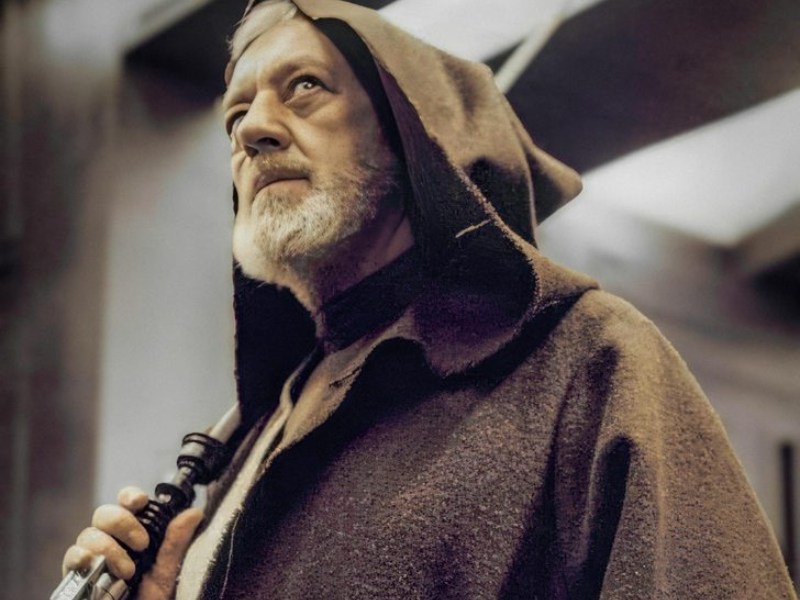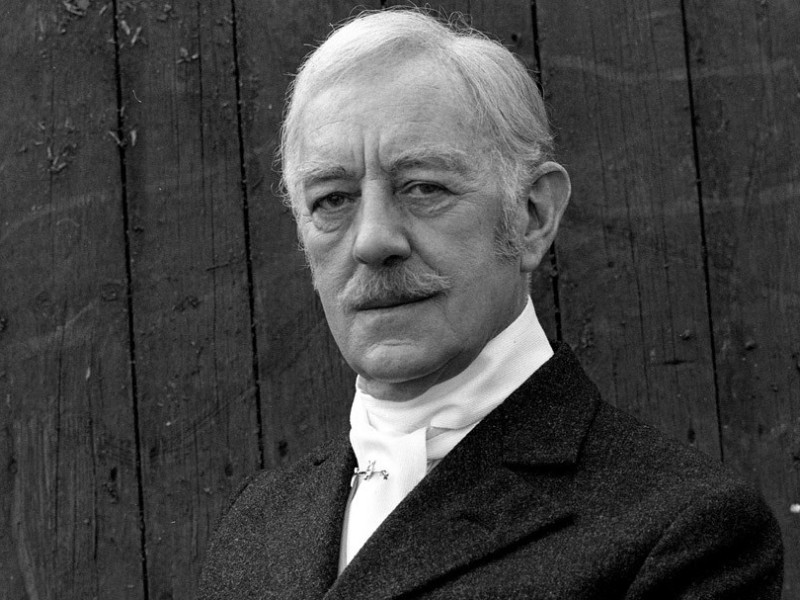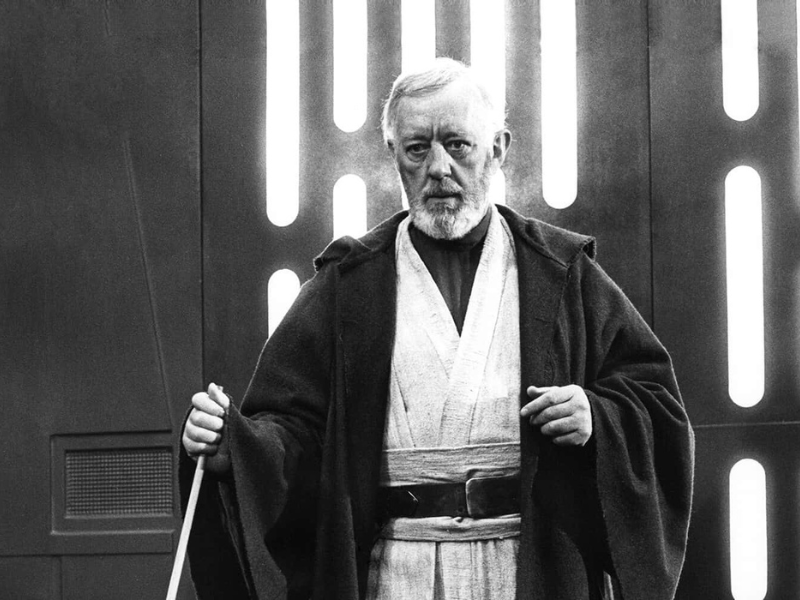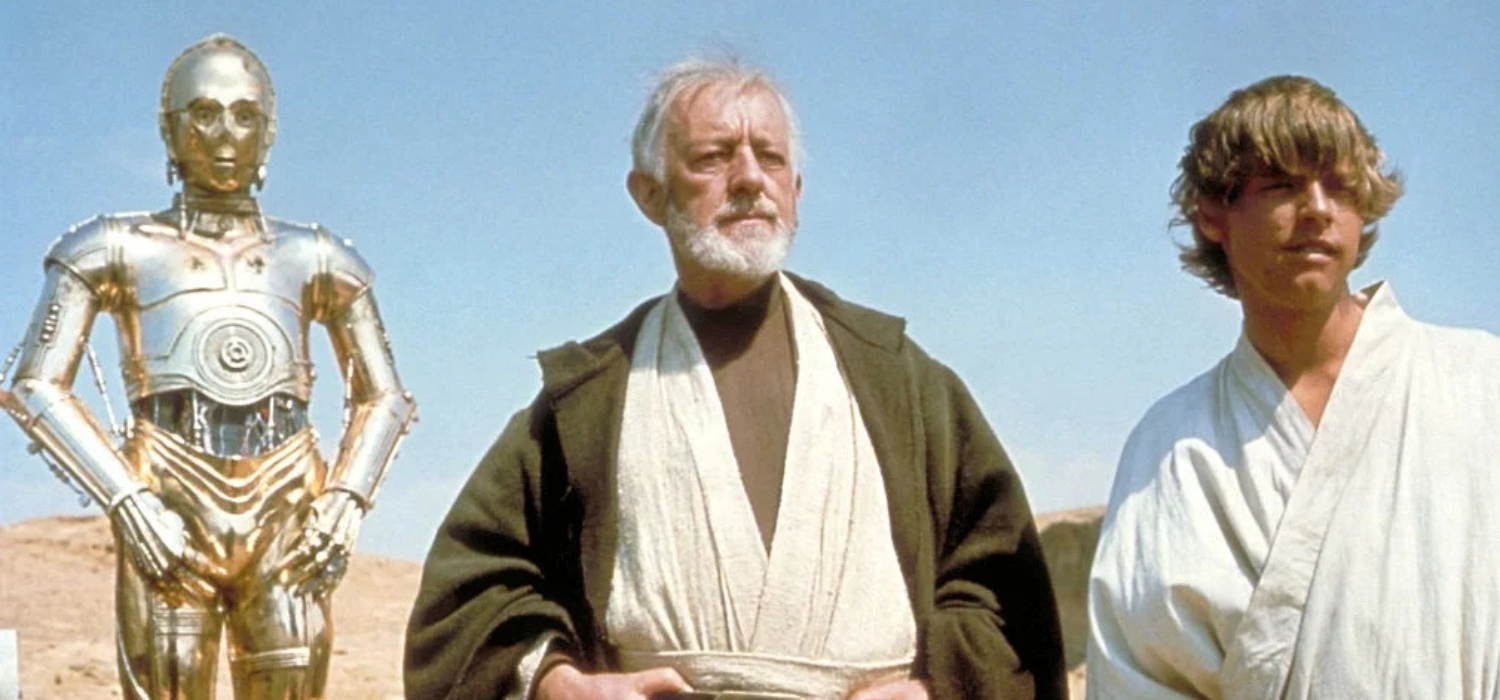Introduction: A Name Synonymous with British Acting Excellence
Few names in the history of cinema resonate with such weight, dignity, and artistry as Sir Alec Guinness. His career, which spanned stage, television, and film, remains a testament to the versatility and craftsmanship that defined British acting in the twentieth century. Known for his ability to transform into characters with an almost invisible ease, Guinness never confined himself to one archetype. Instead, he shifted seamlessly from Shakespearean tragedies to lighthearted comedies, and from wartime dramas to science fiction epics.
When people recall the phrase “the quintessential British actor,” it is Guinness who often comes to mind. His profound stage presence, his unique command over dialogue, and his ability to balance restraint with intensity carved him a permanent place among acting legends. But Guinness was not just a performer; he was a storyteller who elevated every script he touched.
Early Life: A Quiet Beginning
Born Alec Guinness de Cuffe on April 2, 1914, in Paddington, London, his childhood was not one of luxury or comfort. Raised by his mother, with little knowledge of his father’s identity, Guinness experienced a somewhat unstable early life. His introduction to the arts came through school and eventually through theater, which offered him a world where imagination could replace uncertainty.
Unlike many actors of his generation, Guinness was not immediately drawn to the limelight. Instead, he had an innate shyness that seemed incompatible with stage performance. Yet, that very modesty and restraint would later become the foundation of his acting style — a style defined by subtlety, nuance, and an aversion to unnecessary flamboyance.
Stage Training: Foundations of Greatness
Guinness’s formal training began at the Fay Compton Studio of Dramatic Art, which prepared him for a career that would balance theater and cinema. He was particularly drawn to Shakespeare, whose plays became a recurring theme throughout his early career.
Joining the Old Vic Theatre, Guinness found himself among Britain’s finest stage actors, working alongside luminaries such as John Gielgud and Laurence Olivier. His performances in Shakespearean roles — Hamlet, Richard II, Romeo — were lauded for their depth and refinement. These formative years cemented his reputation as a stage actor who could embody complex characters with understated brilliance.
The Transition to Film
The 1940s brought with them a gradual shift for Guinness from stage to screen. His film debut was unassuming, but it was his partnership with director David Lean that catapulted him into cinematic greatness. Together, they would collaborate on some of the most iconic films in British cinema.
Guinness’s breakthrough came in Great Expectations (1946), where he played Herbert Pocket. This performance introduced audiences to his ability to bring warmth and wit to supporting roles. From there, he quickly rose through the ranks, soon becoming a leading man in his own right.
Collaboration with David Lean: A Historic Partnership
The Guinness-Lean partnership produced masterpieces that remain etched in the history of cinema. Oliver Twist (1948) saw Guinness take on the role of Fagin, a performance that was both memorable and controversial for its interpretation. Though criticized for its stereotypical portrayal, it remains an example of Guinness’s fearlessness in immersing himself in morally complex roles.
Their collaboration reached new heights with The Bridge on the River Kwai (1957), where Guinness’s portrayal of Colonel Nicholson earned him an Academy Award for Best Actor. His performance of a rigid yet morally conflicted officer in a prisoner-of-war camp remains one of the greatest in film history. Guinness brought to Nicholson a balance of authority, vulnerability, and obsession, turning what could have been a simple war role into a profound character study.
Later collaborations with Lean included Lawrence of Arabia (1962), where Guinness embodied Prince Faisal, and Doctor Zhivago (1965), where he portrayed General Yevgraf Zhivago. Each role added another layer to Guinness’s reputation as a chameleon of the screen.

The Ealing Comedies: A Lighter Side
While Guinness’s dramatic roles often commanded the most attention, it was in comedy that he demonstrated his remarkable versatility. His work in the Ealing comedies of the 1950s showcased a lighter, mischievous side of the actor.
In Kind Hearts and Coronets (1949), Guinness famously played eight different characters — members of the D’Ascoyne family — all of whom are dispatched one by one in a darkly comic story. The performance remains one of the most extraordinary feats in cinema history, demonstrating his ability to shift accents, personalities, and mannerisms with effortless ease.
Other comedic gems included The Lavender Hill Mob (1951) and The Man in the White Suit (1951), both of which revealed his impeccable timing and ability to anchor stories with a blend of charm and irony. These films established Guinness as an actor equally at home in serious drama and in playful satire.
Global Recognition: Obi-Wan Kenobi and Star Wars
For younger generations, Sir Alec Guinness is often best remembered as Obi-Wan Kenobi in George Lucas’s Star Wars (1977). Though Guinness initially viewed the role with skepticism — famously describing the dialogue as “rubbish” — his portrayal of the wise Jedi mentor became iconic.
What made Guinness’s Obi-Wan so memorable was his ability to imbue the role with gravitas. He treated the part with the same seriousness as Shakespeare, lending authenticity to a universe of fantasy. His presence anchored the film, giving it credibility and bridging the gap between science fiction spectacle and dramatic storytelling.
Though Guinness reportedly had mixed feelings about being so strongly associated with the franchise, his performance introduced him to millions of fans around the world, ensuring his legacy extended well beyond British cinema.
Awards and Accolades
Over his career, Guinness was recognized with numerous honors. In addition to his Academy Award for The Bridge on the River Kwai, he received multiple BAFTA Awards and a Golden Globe. He was knighted by Queen Elizabeth II in 1959 for his contributions to the arts, a recognition that placed him firmly among the most esteemed figures in British cultural history.
In 1980, he received a Lifetime Achievement Academy Award, further cementing his status as one of the greats. The combination of stage brilliance, cinematic mastery, and humility in personal life gave Guinness an unmatched aura.
Personality and Approach to Acting
Despite his fame, Guinness was known for his quiet and reserved personality. He avoided the celebrity lifestyle and rarely sought publicity, preferring instead to let his work speak for itself. This humility, combined with his devotion to craft, made him a revered figure among peers and a role model for younger actors.
His approach to acting was deeply rooted in discipline and observation. Guinness once remarked that the key to his performances was disappearing into the role — becoming unrecognizable, even to himself. This philosophy explains his vast range, as he never allowed vanity or ego to overshadow the character.
Later Career: Expanding Horizons
After the monumental success of The Bridge on the River Kwai and his defining work with David Lean, Guinness entered the 1960s and 1970s with an artistic curiosity that refused to fade. He deliberately sought out roles that were different from what audiences expected, reinforcing his reputation as an actor of immense range.
During this period, Guinness appeared in films such as Tunes of Glory (1960), in which he played Colonel Jock Sinclair. The performance was a masterclass in controlled intensity, portraying a man torn between pride, insecurity, and duty. The film allowed Guinness to display raw emotion and psychological complexity, diverging from his earlier restrained characters. Critics hailed it as one of his greatest achievements on screen.
Another memorable performance came in The Horse’s Mouth (1958), adapted from Joyce Cary’s novel. Here, Guinness took on the role of Gulley Jimson, an eccentric painter obsessed with his art. What makes this film particularly remarkable is that Guinness not only acted in it but also wrote the screenplay, earning an Academy Award nomination for Best Adapted Screenplay. This venture demonstrated his creative versatility beyond acting.

Television Work: A New Medium for an Established Star
As television grew into a respected storytelling platform in the latter half of the 20th century, Guinness embraced it with the same seriousness he brought to stage and film. One of his most acclaimed television performances was in the adaptation of John le Carré’s Tinker Tailor Soldier Spy (1979), where he played George Smiley.
Smiley was the antithesis of a glamorous spy — quiet, intellectual, and often overlooked. Guinness captured the subtlety of the character perfectly, giving Smiley an air of quiet authority and moral depth. The series was both a critical and popular success, and Guinness reprised the role in Smiley’s People (1982). His interpretation remains, to many, the definitive screen version of the le Carré character.
Through these television roles, Guinness demonstrated yet again his ability to dominate any medium, bringing nuance to even the smallest gesture or pause.
Relationship with Star Wars: A Mixed Legacy
While Star Wars (1977) introduced Guinness to a new generation of fans, his feelings about the role of Obi-Wan Kenobi were famously complicated. He respected George Lucas’s vision but found the script awkward and the attention from fans overwhelming.
Guinness often remarked that he wished audiences remembered him more for his Shakespeare or his dramatic films than for the Jedi Knight. Yet, despite his reservations, he brought an irreplaceable presence to the trilogy. His portrayal gave Obi-Wan a spiritual gravitas that transcended the space-fantasy setting.
Even today, the line “Use the Force, Luke” carries emotional weight largely because of Guinness’s sincerity. His decision to treat the character with dignity rather than campiness is one of the key reasons Star Wars became more than just a science fiction adventure — it became a cultural touchstone.
Honors and Knighthood: Recognition of Genius
By the late 1950s, Guinness was already regarded as one of Britain’s greatest living actors. His knighthood in 1959 confirmed his standing, placing him in the same category as stage titans like Laurence Olivier and John Gielgud.
Guinness’s recognition did not stop there. Over the following decades, he received BAFTA Awards, Golden Globes, and the Academy Award for Lifetime Achievement in 1980. Few actors in history have been celebrated across so many different mediums with such consistency.
Personal Life: A Man of Contrasts
Despite his fame, Guinness maintained an intensely private life. He married actress Merula Salaman in 1938, and their marriage lasted until his death in 2000 — a rare stability in the entertainment world. Together, they had one son, Matthew, who also pursued acting.
Guinness was also known for his devout faith, converting to Roman Catholicism in 1956 after a period of spiritual searching. Religion played a significant role in his later years, offering him both comfort and perspective.
Friends and colleagues described him as modest, witty, and sometimes reserved. He shunned the Hollywood lifestyle, preferring quietude over publicity. His humility stood in stark contrast to the towering achievements of his career.
Influence on Future Generations of Actors
Sir Alec Guinness inspired countless actors, both in Britain and abroad. His emphasis on subtlety, character immersion, and discipline became a model for performers seeking depth over showmanship. Actors such as Gary Oldman, Ralph Fiennes, and Ben Kingsley have cited Guinness as a profound influence on their craft.
In particular, his portrayal of George Smiley continues to inspire actors approaching complex, understated roles. Meanwhile, his work in comedies such as Kind Hearts and Coronets demonstrated that versatility, rather than specialization, was the mark of true greatness.

The Final Years and Death
Guinness’s later years were marked by selective roles and increasing recognition for his lifelong contributions to cinema and theater. Though he worked less frequently in the 1990s, he remained a revered figure.
He passed away on August 5, 2000, at the age of 86. His death marked the end of an era, as one of the last great actors of Britain’s golden age of cinema departed the stage. Yet his legacy lives on, not only in his films but in the standards he set for acting as a craft.
Timeless Lessons for Actors
For actors today, Guinness’s career offers timeless lessons:
- Versatility is strength: his seamless transitions between comedy, drama, and even science fiction underline the value of adaptability.
- Subtlety is powerful: his belief in understatement remains a guiding principle for performers seeking depth.
- Integrity matters: Guinness consistently chose roles that challenged him, rather than chasing trends.
His journey is a reminder that true artistry often comes from discipline and humility rather than constant visibility.
Conclusion: A Quintessential British Actor
Sir Alec Guinness embodied everything that defines a quintessential British actor — intelligence, restraint, versatility, and commitment to craft. From Shakespeare to Hollywood, from David Lean epics to Star Wars, from stage to television, he proved that acting at its highest level is a lifelong dedication.
Though he passed away in 2000, his presence remains alive in the films that continue to inspire audiences. His performances are not simply historical artifacts but living examples of the art of acting.


